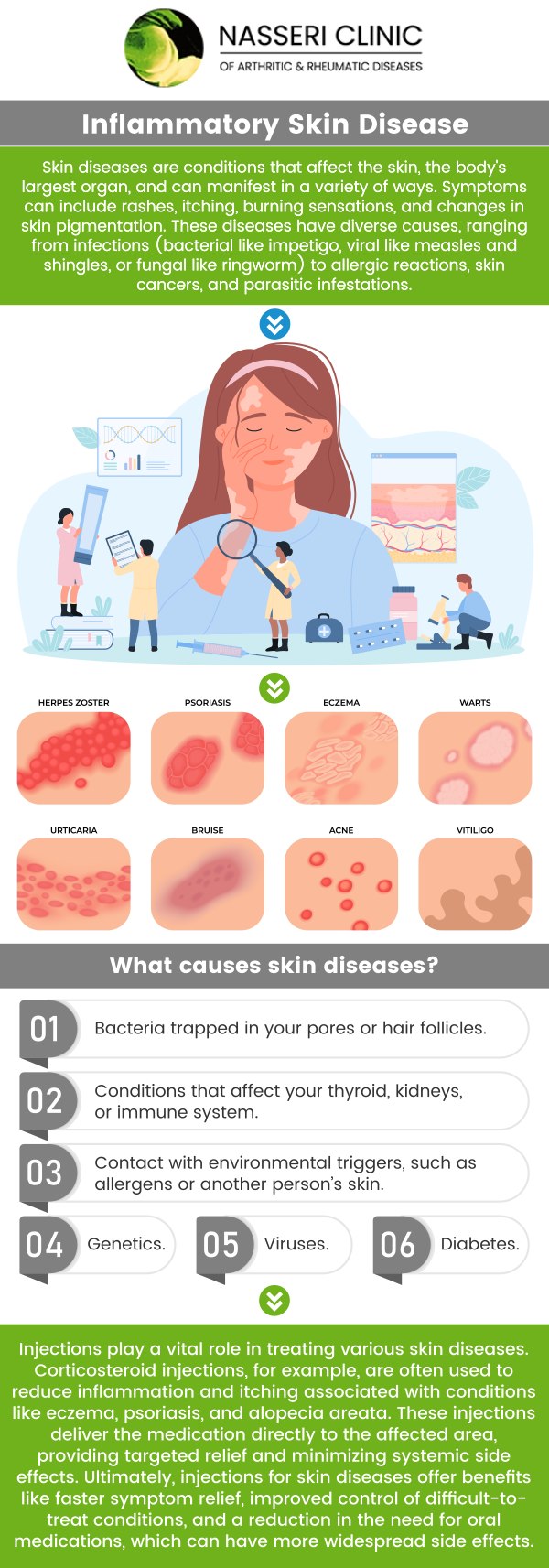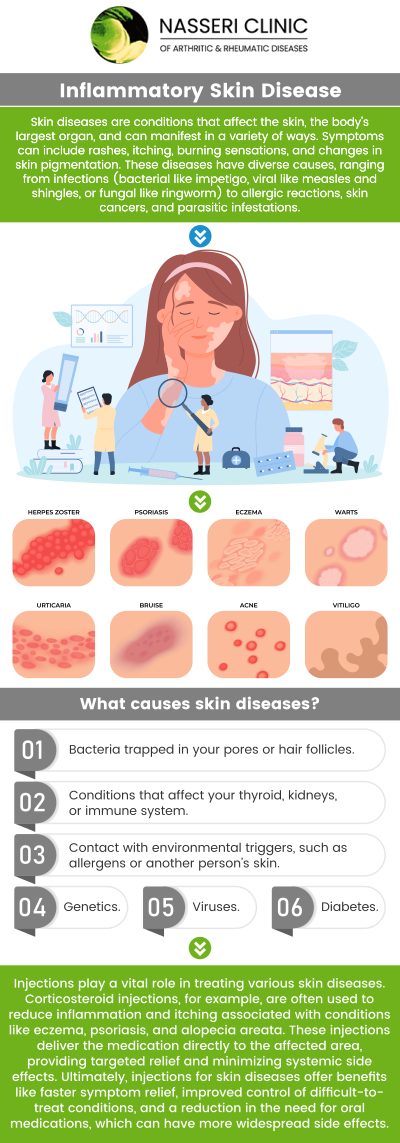Inflammatory Skin Disease Treatment Specialist in Maryland
If you’re seeking effective treatment for inflammatory skin diseases, Dr. Nasseri, MD, offers specialized care. For comprehensive care and relief from skin inflammation, our clinic provides personalized treatment plans designed to manage symptoms and improve quality of life. For more information, contact us or book an appointment online. We have convenient locations to serve you in Rosedale, Columbia, Glen Burnie, North Baltimore, Edgewater, and Catonsville MD.




Table of Contents:
What does inflammatory skin look like?
What is the most common inflammatory skin disease?
What infection causes skin inflammation?
How do injections help treat inflammatory skin diseases?
Inflammatory skin conditions are common in patients with arthritic and rheumatic diseases, and recognizing these symptoms is essential for effective care at the Nasseri Clinic of Arthritic and Rheumatic Diseases. Inflammatory signs like redness (erythema) and swelling (edema) may occur in conditions such as psoriatic arthritis, affecting both joints and skin. Heat (calor) and pain (dolor) are also common in diseases like rheumatoid arthritis, indicating inflammation and flare-ups. Itching (pruritus) and changes in skin texture, such as the malar rash in lupus, are key diagnostic clues for systemic lupus erythematosus, particularly when accompanied by joint pain. Conditions like psoriasis may cause scaling (desquamation) and crusting, signaling psoriatic arthritis. Blistering and ulceration, seen in vasculitis, can indicate more severe systemic involvement. Recognizing these dermatological manifestations is crucial for accurately diagnosing and treating the underlying rheumatic disease, ensuring comprehensive patient care.
At the Nasseri Clinic of Arthritic and Rheumatic Diseases, our rheumatology specialists recognize the critical role inflammation plays in a variety of health conditions, including eczema, the most common inflammatory skin disease. Although our focus is primarily on arthritic and rheumatic conditions, we understand the connections between inflammation in these conditions and eczema, offering insights into a more comprehensive care approach.
Eczema and rheumatic diseases like rheumatoid arthritis and lupus share common inflammatory mechanisms, and understanding these connections can improve patient care. Both conditions can significantly affect a patient’s quality of life, as they involve chronic inflammation that impacts the skin and joints. Genetic predispositions, along with environmental triggers such as stress and allergens, can exacerbate symptoms in both conditions.
At Nasseri Clinic, we emphasize comprehensive diagnosis and individualized treatment plans for eczema patients, just as we do for those with rheumatic conditions. This includes anti-inflammatory medications, both topical for eczema and systemic for rheumatic diseases, along with lifestyle modifications such as stress management, dietary changes, and consistent care routines. We also incorporate innovative services like biologics, which target specific inflammatory pathways. Our holistic approach recognizes that managing one inflammatory condition can often improve others, contributing to enhanced overall health and well-being.
At Nasseri Clinic of Arthritic and Rheumatic Diseases, understanding the link between skin inflammation and rheumatic conditions is crucial for effective patient care. Many rheumatic diseases have associated skin manifestations that not only provide diagnostic clues but also influence treatment plans.
Psoriatic arthritis, for example, involves both joint and skin symptoms, such as scaly patches, requiring coordinated care from both dermatology and rheumatology specialists. Lupus erythematosus often presents with a butterfly-shaped rash or disc-shaped lesions, highlighting the importance of managing skin symptoms to monitor disease activity. Rheumatoid arthritis can lead to skin issues like rheumatoid nodules or vasculitis, indicating disease severity or complications. Dermatomyositis is another condition where skin rashes, like the heliotrope rash, are crucial in diagnosing and managing the disease early.
Patients with rheumatic diseases are also at higher risk for infections due to immunosuppressive treatments. This increases the need for vigilant monitoring for skin infections, including bacterial, fungal, or viral types, to prevent complications.
A holistic approach to treatment that addresses both joint and skin symptoms is vital to improve overall patient quality of life and manage the multifaceted nature of rheumatic conditions.
How Injections Help Treat Arthritic and Rheumatic Diseases:
Injections are a key therapeutic approach at the Nasseri Clinic, offering targeted relief for chronic inflammatory conditions when oral or topical treatments are insufficient.
Mechanism of Action:
Injections work by reducing inflammation, inhibiting disease pathways, and promoting tissue repair.
• Reducing inflammation: Corticosteroid injections suppress the immune response, alleviating pain, swelling, and stiffness in affected joints.
• Inhibiting disease pathways: Biologic agents target specific molecules in the inflammatory process, slowing disease progression, especially in conditions like rheumatoid arthritis and psoriatic arthritis.
• Promoting tissue repair: Platelet-rich plasma (PRP) injections deliver growth factors to aid tissue repair, improving function and reducing pain.
Types of Injections Used:
• Corticosteroids: Commonly used to reduce inflammation and provide relief in joints.
• Biologic agents: Target immune pathways for long-term control of inflammation.
• Platelet-rich plasma (PRP): Used to promote healing and tissue regeneration in damaged joints.
Benefits of Injections:
Injections offer targeted treatment, maximizing efficacy and minimizing side effects. They provide faster symptom relief compared to oral medications and can offer long-lasting effects, especially with biologics.
At the Nasseri Clinic of Arthritic and Rheumatic Diseases, our team utilizes advanced therapies to reduce inflammation and improve skin health. With personalized care plans, we aim to provide long-term relief and enhance your overall quality of life. For more information, contact us or request an appointment online. We serve patients from Rosedale MD, Columbia MD, Glen Burnie MD, Catonsville MD, North Baltimore MD, Edgewater MD, Parkville MD, Middle River MD, Dundalk MD, Halethrope MD, Ellicott City MD, Laurel MD, Hebbville MD, and Woodlawn MD.
Check Out Our 5 Star Reviews


Additional Services You May Need

Additional Services You May Need
▸ Arthritis Care
▸ Infusion Therapy
▸ Lab Services
▸ Radiology
▸ NCARD NRACE
▸ BioFlex Laser Therapy
▸ Ultrasound Guided Injection
▸ NCARD PRP
▸ NCARD Myers
▸ Rheumatology
▸ Myositis
▸ Osteoporosis
▸ Ulcerative Colitis
▸ Multiple Sclerosis
▸ Saphnelo Infusion
▸ Injection Treatments
▸ Intravenous Immunoglobulin Therapy
▸ Asthma
▸ Crohn’s Disease
▸ Fibromyalgia
▸ Infusion Therapy for Gout
▸ Inflammatory Eye Disease
▸ Inflammatory Skin Disease
▸ Vasculitis
▸ Iron Deficiency
▸ Lupus


